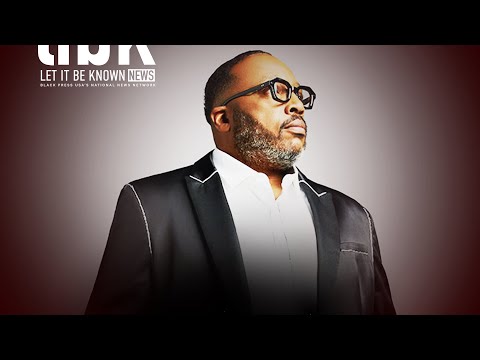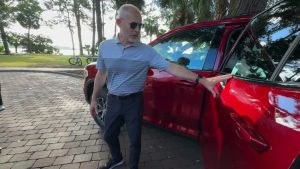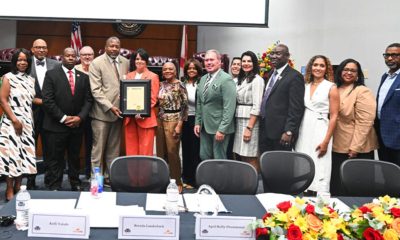#NNPA BlackPress
House and Senate Introduce Bill to ensure Insurance Coverage for Abortion
NNPA NEWSWIRE — “The EACH Woman Act ensures that every woman is empowered to make critical decisions about her own pregnancy – and has coverage for all pregnancy-related health care, including abortion – regardless of her financial situation,” U.S. Rep. Barbara Lee (D-Calif.)
By Stacy M. Brown, NNPA Newswire Correspondent
@StacyBrownMedia
Women of color and their allies in the U.S. Senate and U.S. House introduced the Equal Access to Abortion Coverage in Health Insurance (EACH Woman) Act on Tuesday, March 12.
The bills have the support of 85 national and state reproductive health, rights, and justice organizations united under the “All* Above All campaign,” which unites organizations and individuals to build support for lifting bans that deny abortion coverage.
The campaign’s vision is to restore public insurance coverage so that every woman can receive safe abortion care when she needs it regardless of the cost.
Tuesday’s action marks the bill’s first ever introduction in the Senate and its third introduction in the House.
It would lift bans on insurance coverage for abortion and follows a historic midterm election that saw a record number of women of color elected to Congress.
“The Supreme Court has repeatedly affirmed women’s constitutional right to make their own reproductive decisions, making clear the government has no place getting in between women and their doctors,” U.S. Senator Tammy Duckworth, (D-Ill.), said in a news release.
“But for decades, conservative lawmakers have worked to whittle down that constitutionally-protected right to the point where it’s now effectively inaccessible for low-income women who rely on Medicaid, for female servicemembers and for millions more women nationwide,” Duckworth said.
She continued:
“The Supreme Court didn’t protect these rights only for wealthy women, and they didn’t say only for women who live in certain states.
“That’s not right, it’s not fair, and it’s certainly not equal – so I’m proud to join my colleagues in introducing the EACH Woman Act so that every woman in this country has equal access to her constitutionally-protected rights, no matter her income, her race, or her zip code.”
U.S. Rep. Barbara Lee (D-Calif.), said no woman should be denied the full spectrum of reproductive health care because of her zip code or income level.
“Yet that is the reality for too many low-income women and women of color,” Lee said.
“The EACH Woman Act ensures that every woman is empowered to make critical decisions about her own pregnancy – and has coverage for all pregnancy-related health care, including abortion – regardless of her financial situation,” she said.
The harmful bans target people of color, interfere with our decisions, and push abortion out of reach, said Destiny Lopez, the co-director of “All* Above All.”
“For years, women of color have been boldly leading this effort and we are proud that women of color are leading the effort in Congress to lift insurance bans,” said Lopez said.
“Trump and his anti-abortion friends in the Senate have already tried three times this year to restrict insurance coverage for abortion, but we’re not having it anymore,” she said.
Specifically, the bill ensures that every woman who receives her health care or insurance through the federal government will have coverage for all pregnancy-related services, including abortion.
In addition, it prohibits political interference with decisions by private health insurance companies to offer coverage for abortion care.
Restricting Medicaid coverage of abortion forces one in four poor women seeking an abortion to carry an unwanted pregnancy to term, Lopez said.
“The EACH Woman Act is game-changing legislation that represents our bold and fearless vision that will transform abortion care for all people in the United States,” she said.
#NNPA BlackPress
LIVE! — HE SAID, HE SAID, HE SAID: APRIL FOR THE ARTS 2025, MARIA LANA QUEEN — FRI. 4.25.25 7PM EST
Tune in Friday, April 25, 2025 @ 7pm EST for another live new episode of “He Said, He Said, He Said Live!” A Look at the World …

https://youtube.com/watch?v=kjPIugVQCAg&autoplay=0&cc_lang_pref=en&cc_load_policy=0&color=0&controls=1&fs=1&h1=en&loop=0&rel=0
Tune in Friday, April 25, 2025 @ 7pm EST for another live new episode of “He Said, He Said, He Said Live!” A Look at the World …
#NNPA BlackPress
The Marathon
Headlines and Cory Booker. LET IT BE KNOWN NEWS | We amplify Black voices and headlines that reflect or impact the Black …

Headlines and Cory Booker. LET IT BE KNOWN NEWS | We amplify Black voices and headlines that reflect or impact the Black …
#NNPA BlackPress
Hot Topics and Headlines
The WHCA board has unanimously decided we are no longer featuring a comedic performance. Lonnie Bunch III is speaking out …

The WHCA board has unanimously decided we are no longer featuring a comedic performance. Lonnie Bunch III is speaking out …
-

 Activism4 weeks ago
Activism4 weeks agoOakland Post Endorses Barbara Lee
-

 Activism3 weeks ago
Activism3 weeks agoOakland Post: Week of April 2 – 8, 2025
-

 #NNPA BlackPress3 weeks ago
#NNPA BlackPress3 weeks agoTrump Profits, Black America Pays the Price
-

 Activism2 weeks ago
Activism2 weeks agoOakland Post: Week of April 9 – 15, 2025
-

 #NNPA BlackPress3 weeks ago
#NNPA BlackPress3 weeks agoHarriet Tubman Scrubbed; DEI Dismantled
-

 #NNPA BlackPress3 weeks ago
#NNPA BlackPress3 weeks agoTrump Targets a Slavery Removal from the National Museum of African-American History and Culture
-

 #NNPA BlackPress3 weeks ago
#NNPA BlackPress3 weeks agoLawmakers Greenlight Reparations Study for Descendants of Enslaved Marylanders
-

 #NNPA BlackPress3 weeks ago
#NNPA BlackPress3 weeks agoNew York Stands Firm Against Trump Administration’s Order to Abandon Diversity in Schools


























































